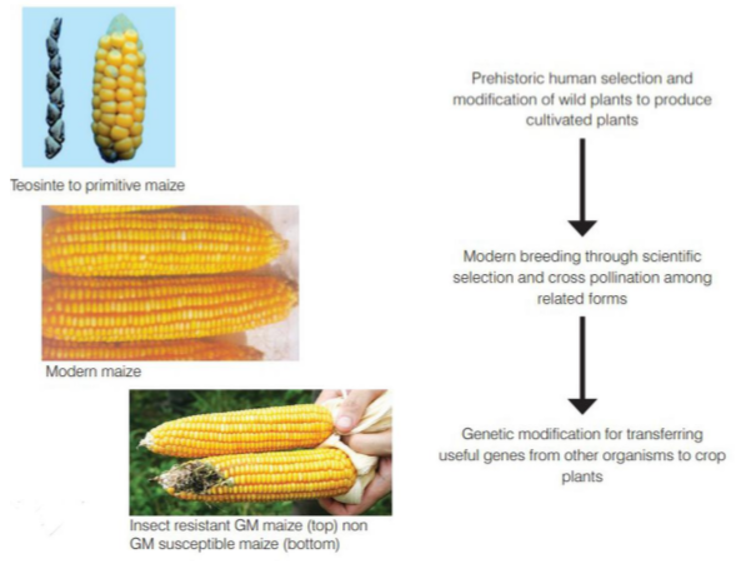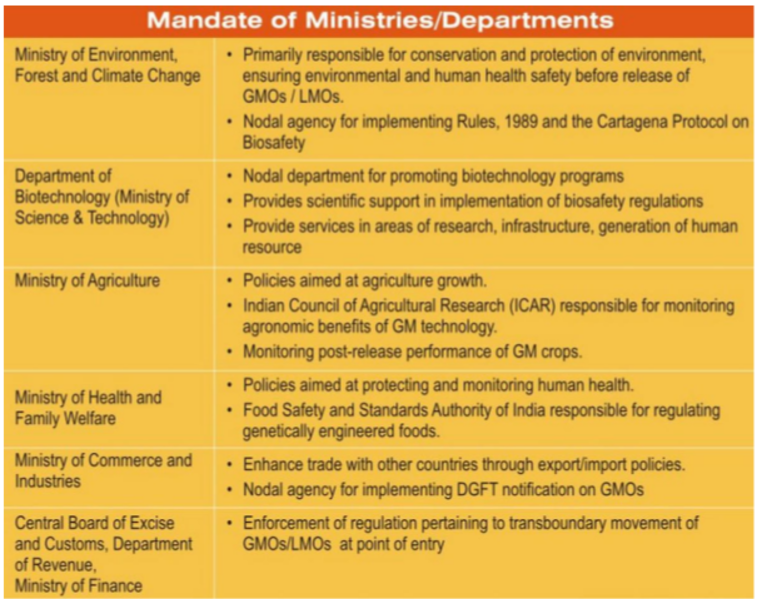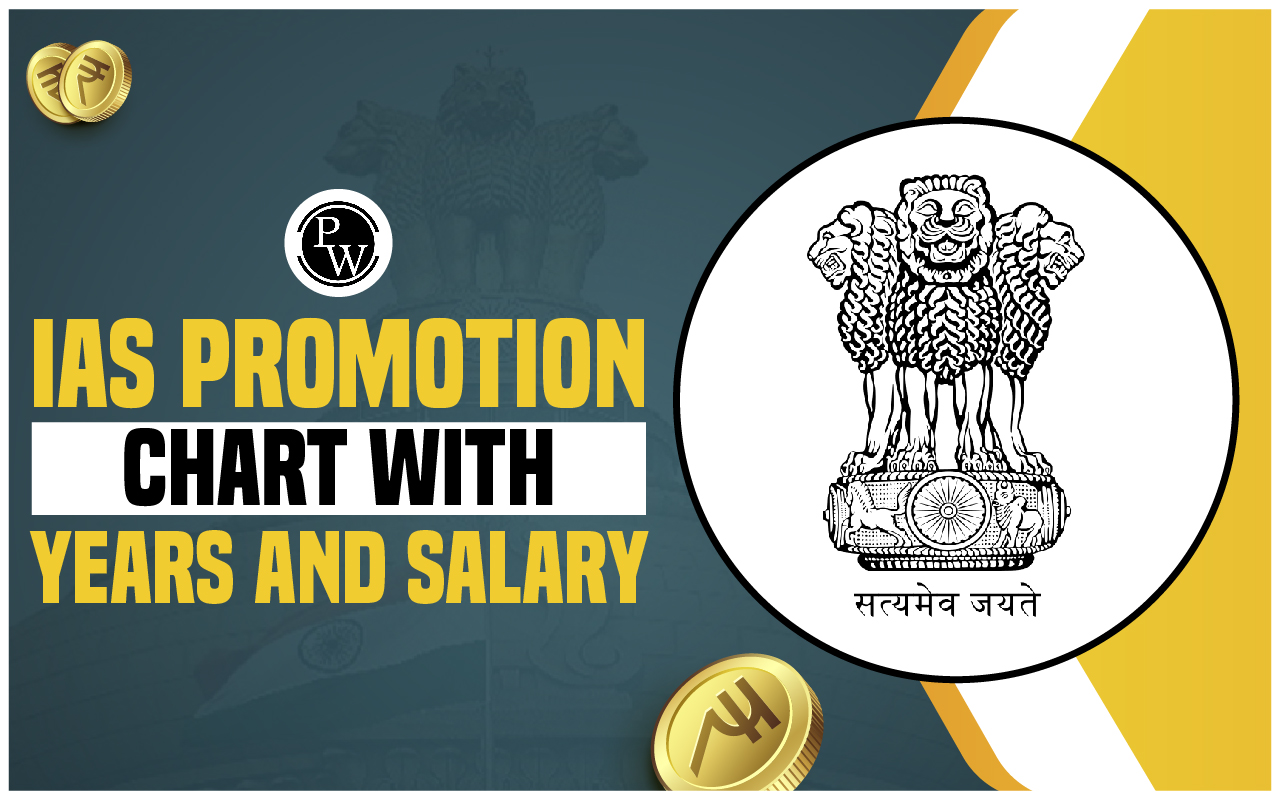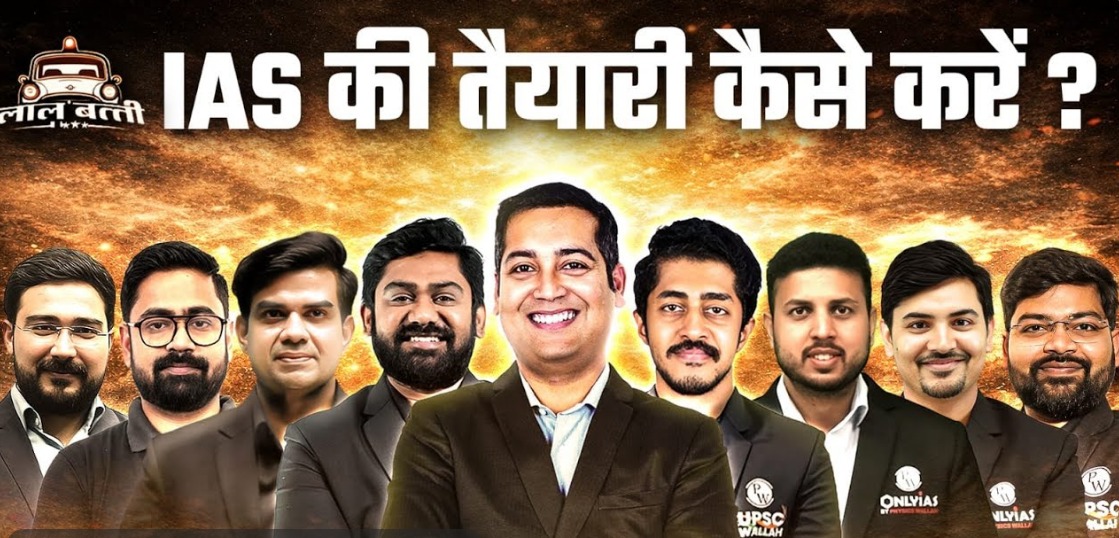
GM Crops: In August 2024 the Supreme Court of India directed the Union Government to create a national policy on Genetically Modified Crops (GM Crops). These crops are developed by altering the DNA of regular crops using genetic engineering techniques.
The goal of introducing GM crops is to improve the crops' resistance to diseases, pests, or environmental conditions, as well as to enhance nutritional value. Keep reading to learn what a genetically modified crop is, its applications, and the concerns surrounding it.GM Crops Full Form
The full form of GM Crops is Genetically Modified Crops. GM Crops refer to plants whose genetic material has been altered using the technique of genetic engineering. This process involves manipulating the DNA of a plant to introduce traits that are not naturally found in the species. Scientists introduce specific genes into the crop's genome to enhance desirable traits like pest resistance, drought tolerance, or improved nutritional content. For example:- Bt cotton: A widely cultivated GM crop in India, modified with genes from Bacillus thuringiensis to resist bollworms.
- Golden Rice: A GM crop fortified with Vitamin A to combat malnutrition.
 Image credit: GEAC
Image credit: GEAC
Applications of Genetically Modified Crops
Genetically Modified crops offer various applications that can significantly transform agriculture and associated industries. Here are the primary applications:- Pest Resistance : One of the most significant benefits of these crops is their ability to resist pests. For example, Bt cotton produces a protein toxic to specific insect pests, reducing the need for harmful pesticides.
- Herbicide Tolerance : Some GM crops, such as glyphosate-resistant soybeans , are engineered to tolerate specific herbicides. This allows farmers to control weeds more effectively without damaging the crops.
- Improved Yield : By introducing specific genetic traits, such as pest resistance, drought tolerance, and disease resistance, GM crops can produce higher yields compared to traditional varieties to ensure food security.
- Reduced Pesticide Use: Pest-resistant GM crops decrease the need for chemical pesticides, protecting biodiversity and reducing environmental toxicity. This also benefits the ecosystems and water quality.
- Enhanced Soil Health: Reduction in chemical inputs helps improve soil quality by preventing degradation. Some GM crops also promote better root systems, reducing erosion and maintaining soil fertility.
- Better Nutritional Value: Some crops like Golden rice can address micronutrient deficiencies, especially in regions where malnutrition is a serious issue. They can help combat Vitamin deficiency and improve public health.
GM Crops in India
India has seen considerable debate over the adoption of GM crops. Bt cotton was introduced in 2002 and remains the only commercialised GM crop in India. The status of GM Crops in India is as follows:- Bt Cotton: It is the first non-food GM crop and has significantly boosted cotton yields by resisting bollworm infestations, reducing the need for pesticides. By 2018-19, Bt cotton made up 95% of the cotton planted in India.
- Bt Brinjal : In 2009, Bt brinjal was cleared by the Genetic Engineering Appraisal Committee (GEAC) for commercial cultivation. However, it faced opposition and was placed under a 10-year moratorium. Field trials for two new Bt brinjal varieties resumed in 2020-2023.
- GM Mustard (DMH-11): Developed by Delhi University, DMH-11 is a GM mustard variety designed to improve yield and disease resistance. It has not yet been approved for commercial cultivation.
Concerns Related to GM Crops
GM crops have been opposed in India despite their advantages due to associated concerns. Here is why Genetically Modified crops are yet to be accepted for large-scale cultivation: Environmental Concerns- Biodiversity Loss: GM crops like GM mustard could cross-pollinate with wild relatives, leading to a reduction in genetic diversity
- Gene Contamination: Gene flow from GM crops to non-GM varieties poses a threat to organic farming and traditional crop varieties.
- Allergenicity and Toxicity: GM crops may introduce new proteins that could be allergens or toxins, raising concerns about human health.
- Glyphosate and Cancer Risk: Glyphosate, widely used with herbicide-tolerant crops, has been classified as a "probable carcinogen" by the WHO.
- Farmers’ Rights : Dependency on multinational companies for patented GM seeds can burden small farmers.
- Economic Inequality : High costs of GM seeds may widen the gap between large-scale and small-scale farmers.
GM Crops Regulation in India
Due to the above concerns, the regulation of GM crops in India is strict to ensure their safety for health and the environment. Multiple agencies work together to govern the approval, trial, and commercialisation processes of a GM crop:Regulatory Bodies
- Genetic Engineering Appraisal Committee (GEAC): The GEAC is the primary body responsible for evaluating and approving GM crops for commercial cultivation. It ensures that GM crops meet safety and environmental standards before they are allowed in the market.
- Review Committee on Genetic Manipulation (RCGM) : The RCGM oversees the research, development, and trials of GM crops. It reviews scientific data on GM crops and ensures that experiments comply with safety protocols before they are submitted to the GEAC for final approval.
- State Biotechnology Coordination Committee (SBCC): The SBCC operates at the state level and coordinates the implementation of biotechnological policies. It ensures that GM crop trials in states comply with national guidelines.

Acts and Policies Regulating GM Crops
- Environment Protection Act (EPA) 1986:
- Biological Diversity Act, 2002
- Plant Quarantine Order, 2003
- GM policy under Foreign Trade Policy
- Food Safety and Standards Act, 2006
- Drugs and Cosmetics Rule (8th Amendment), 1988
UPSC PYQs on Genetically Modified CropsUPSC Prelims 2018 : With reference to the Genetically Modified 65 mustard (GM mustard) developed in India, consider the following statements:
|
To learn such complex topics in detail, explore PW UPSC Courses now!
| UPSC Related Articles | ||
| UPSC Prelims Questions | NCERT for UPSC Exam 2025 | UPSC Mains Admit Card |
| UPSC Mains Exam Pattern | Supreme Court of India | Production Linked Incentive Scheme |
GM Crops FAQs
What are GM crops?
GM crops are genetically modified crops created by altering their DNA to enhance traits like pest resistance, drought tolerance, or nutritional value.
What are some examples of GM crops?
Examples include Bt cotton (pest-resistant), Golden Rice (Vitamin A-enriched), and genetically engineered soybeans (herbicide-resistant).
Why is Bt cotton significant in India?
Bt cotton, India’s first GM crop, significantly increased cotton yields and reduced the need for chemical pesticides.
Are GM crops banned in India?
No, GM crops are not completely banned, but India has restrictions on the cultivation and import of genetically modified crops and foods.
How are GM crops regulated in India?
The Genetic Engineering Appraisal Committee (GEAC) and other regulatory bodies ensure GM crops’ safety through strict approval and monitoring processes.
Talk to a counsellorHave doubts? Our support team will be happy to assist you!

Check out these Related Articles
Free Learning Resources
PW Books
Notes (Class 10-12)
PW Study Materials
Notes (Class 6-9)
Ncert Solutions
Govt Exams
Class 6th to 12th Online Courses
Govt Job Exams Courses
UPSC Coaching
Defence Exam Coaching
Gate Exam Coaching
Other Exams
Know about Physics Wallah
Physics Wallah is an Indian edtech platform that provides accessible & comprehensive learning experiences to students from Class 6th to postgraduate level. We also provide extensive NCERT solutions, sample paper, NEET, JEE Mains, BITSAT previous year papers & more such resources to students. Physics Wallah also caters to over 3.5 million registered students and over 78 lakh+ Youtube subscribers with 4.8 rating on its app.
We Stand Out because
We provide students with intensive courses with India’s qualified & experienced faculties & mentors. PW strives to make the learning experience comprehensive and accessible for students of all sections of society. We believe in empowering every single student who couldn't dream of a good career in engineering and medical field earlier.
Our Key Focus Areas
Physics Wallah's main focus is to make the learning experience as economical as possible for all students. With our affordable courses like Lakshya, Udaan and Arjuna and many others, we have been able to provide a platform for lakhs of aspirants. From providing Chemistry, Maths, Physics formula to giving e-books of eminent authors like RD Sharma, RS Aggarwal and Lakhmir Singh, PW focuses on every single student's need for preparation.
What Makes Us Different
Physics Wallah strives to develop a comprehensive pedagogical structure for students, where they get a state-of-the-art learning experience with study material and resources. Apart from catering students preparing for JEE Mains and NEET, PW also provides study material for each state board like Uttar Pradesh, Bihar, and others
Copyright © 2026 Physicswallah Limited All rights reserved.









